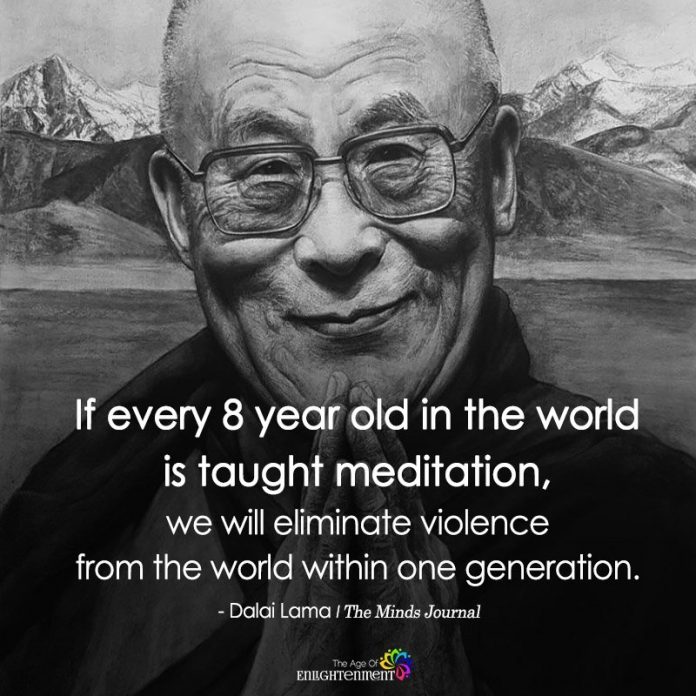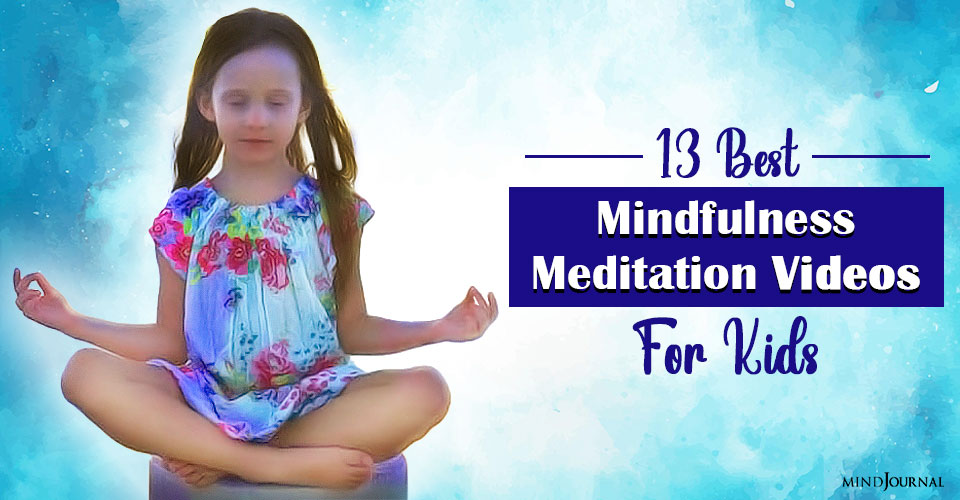Encourage your kids to learn the beneficial art of paying attention to the present moment with mindfulness meditation.
According to the London Journal of Primary Care, mental health issues in children are increasing worldwide. The prevalence of mental health disorders in children and adolescents is almost 15% globally. As per the World Health Organization, 50% of all mental illnesses like anxiety, depression, eating disorders, and others begin by the age of 14 and three-quarters by the mid-20s.
Research suggests a combination of factors such as heredity, psychological trauma, biology, or environmental stress, and others are causes of mental health problems in children. But, currently, school closures, social restrictions, and lack of outdoor play, are some of the factors increasing the risk of lasting psychological distress in 1 in every 4 children stuck indoors.
According to the study published in the Journal of Mental Health, children stuck at home are found to be restless, in some cases violent, some are exposed to domestic violence and other problems. Research shows that the feeling of helplessness, loneliness, fear of being socially excluded in vulnerable children, fear of not being able to complete the school year in students, restlessness; may increase the number of anxiety, depression, and other mental health cases.
What is the best way to calm down cranky kids at home? How to help them self-regulate when they are stressed or the day feels topsy-turvy? How to prevent or help them deal with anxiety and fear? Research confirms that Mindfulness may address mental health concerns in children!
Mindfulness for kids
Mindfulness means to be in the present by noticing what you are doing now, how you are feeling, what you are hearing, and focusing on something but in a relaxed way. It is the process of taking time to slow down. There is no rushing, no stress, no multi-tasking, and no worry.
No matter what you’re doing, whether playing basketball, drawing, listening to podcasts, or anything else, if you are paying 100% attention, then you are mindful.

Related: How To Make Entitled Kids Grateful: 7 Helpful Strategies
Mindfulness Videos for kids
Here’s the list of YouTube Videos on Mindfulness Exercises for kids to help your child hone a wonderful skill.
1. The Science Behind Mindfulness Meditation
Based on the studies of neuroscience and other researches, this video explains the science of meditation and how mindfulness restructures the brain. Learn the power of the mind through this brilliant presentation.
Check the video here
Related: The Power Of Play For Children: Why Playtime Is So Important For Kids
2. Mind the Bump
An informative video on mindfulness meditation and how it impacts the brain. Kids will get to know the importance of mindfulness skills and gear up to start the practice. Those who are new to the topic will find this insightful.
Watch the video here.
3. Kids Explain Mindfulness
A wonderful compilation of what kids think about mindfulness and its benefits. Watch this video with your young ones and it will surely motivate them to try mindfulness to overcome anxiety due to pandemics and social isolation.
Watch the video here
4. Minute Body Scan Meditation
This video teaches about body scan where kids have to focus on toes and all the way through the entire body. This mindfulness exercise helps kids to pay attention to minute details of their bodies and slowly move on to more spacious awareness.
A great technique to get in touch with one’s body and interrupt the stress responses. Focusing on body parts will help you stop thinking about other matters, let go of feelings of accomplishing schoolwork or other tasks, and release bottled-up emotions.
Watch the video here
5. Teaching Mindfulness To Children At Home And In Schools
The story of Dante who has a habit of thinking about the past and future and losing concentration is very relatable. Targeted to older children, this video explains how mindfulness can help focus on the present, lower stress, anxiety, and depression. The video teaches how mindful activities for kids can help your kid deal with a problem without reacting.
Watch the video here
6. The Listening Game
This mindfulness for kids video teaches the game of listening. The technique requires you to listen to the sounds of the bells. It’s a form of meditation that tests how well you can listen and how long you can. By improving listening skills, one can better respond to the input from the world and experience life so much more.
Watch the video here
Related: Ichigo Ichie: The Japanese Art of Living Every Moment

7. Mindfulness Meditation for Kids
This video teaches kids about meditation that is 5 minutes in length. All you have to do is bring your attention to your breathing, body sensation, and emotions. It can be practiced at any time of the day.
The objective is to bring your awareness to the present moment and reset your nervous system. Over time, this mindfulness practice will promote greater ease and calmness. You’ll learn to navigate day-to-day stress and cultivate greater resiliency and well-being.
Watch the video here
Related: 20+ Best Meditation Music For Relief From Stress and Anxiety
8. Breath Meditation for Kids
This mindfulness technique requires kids to curiously explore their breath. If that is difficult, you may simply put your hands on your belly and focus on what is happening to you. You can imagine a sailboat rising and falling over waves each time you breathe in and out. As air enters the nostrils when you inhale, you must notice whether it feels warm or cool and does it feel the same when air flows out.
The video also teaches about mental imagery where kids see the breath as color as they inhale and exhale. And imagine themselves as fish and are feeling the air in their lungs for the first time.
Watch the video here
9. Peace Out Guided Relaxation for Kids
Peace Out is a series of guided relaxations and visualizations for kids. In this mindfulness video, kids are taught to explore their thoughts and feelings. Practicing it on a daily basis will make kids feel calmer and happier.
The guided relaxation technique works like an eyeopener in the deep mind-body connection. And help children find links between emotions and physical sensations. Mindfulness involves becoming a nonjudgmental, outside observer of your own thoughts. Are you ready to try this mind-calming technique?
Watch the video here
Related: This School Replaced Detention with Meditation and Has Achieved Wonders
10. Guided Meditation for Children
This guided meditation video will kill your stress!
You have to imagine standing on a gentle hillside, visiting a magical waterfall, and seeing a beautiful landscape. The soft music and soothing voice will help you avoid distractions, settle your thoughts, unravel tension in the body, relieve stress, and feel ecstatic.
Watch the video here
11. 20 minute Guided Mindfulness Exercise
This 20 minutes mindfulness exercise guided by an amazing and soothing voice is best for older kids and teens. The video is the combination of mindfulness practices of observing the breath and Passive Progressive Relaxation (PPR). This technique brings awareness to myriad sensations that occur throughout your body.
Practicing this technique on a daily basis will relax your body, quieten your mind, and push you to a happy zone. Kids will understand their bodies and minds better and learn to live better even with problems and worries.
Watch the video here
12. Hot Air Balloon Ride: A Guided Meditation for Kids
15 minutes guided mindful activity for kids that will promote good sleep and dreaming. This video is perfect for kids of all ages and is best if practiced at bedtime.
You need to lie down on a bed, imagine a hot air balloon, visiting a zoo, and going for a balloon ride with your favorite animal from the zoo.
Such children’s visualization technique is great for relaxation and washing away stress, anxiety, or worries.
Watch the video here
13. 5 Mindful Activities for Kids
This video teaches 5 simple and practical mindful activities for kids 5 years and up.
Each one is designed to improve self-regulation, unwind the mind, tune into their listening, and sharpen concentration.
Watch the video here
Benefits of mindfulness exercises for kids
Mindfulness helps gain awareness of the mind, body, and environment. This is the skill that increases self-regulation and self-awareness. If children practice mindfulness, they can
- Be less restless
- Concentrate better
- Stay calm and lower anxiety
- Learn more
- Increase attention span and inquisitiveness
- Improve listening skills
- Develop coping skills, confidence, and emotional resilience
- Avoid distractions
- Self-discover
- Stay happy and enjoy better
Related: Teens And Dangerous Levels Of Cell Phone Use
However, it will not happen overnight, because training your mind takes time. There are various ways to help your kids develop mindfulness.
Mindfulness is one of the most beneficial and powerful things that you can do for your well-being. Try the above-suggested mindful activities for kids videos and let me know the results in the comments.
Check out this video:












Leave a Reply